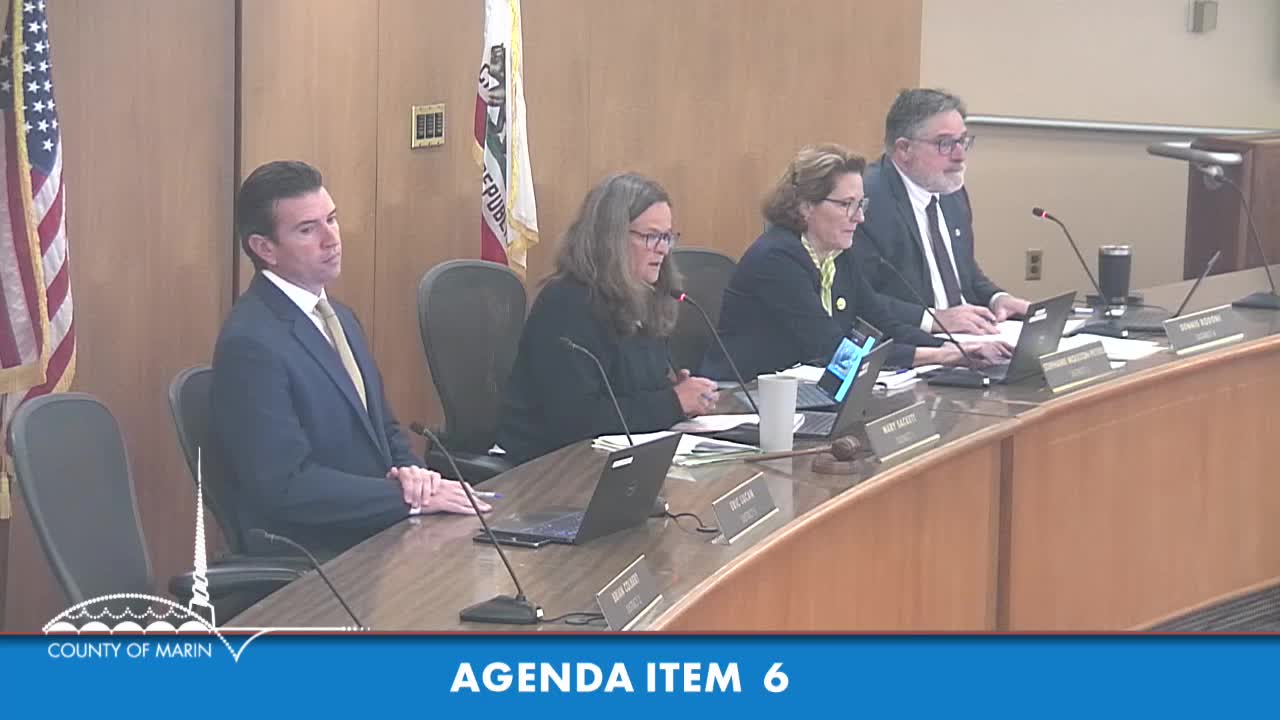Marin supervisors back conceptual step for Oak Hill workforce housing guarantor program
Get AI-powered insights, summaries, and transcripts
Subscribe
Summary
The Board of Supervisors gave conceptual approval for a guarantor financing program designed to lower borrowing costs for the Oak Hill workforce-housing project, while directing third‑party financial review and further negotiations before any binding commitment.
The Marin County Board of Supervisors on April 15 voted to advance a conceptual guarantor financing program intended to close a funding gap for the Oak Hill workforce housing project, a 35‑unit development planned for state‑owned land and targeted to school employees and county staff.
County staff and the project’s financial advisers told the board that rising interest rates and construction costs produced a multimillion‑dollar shortfall that the Marin County Public Finance Authority and the project team say could be substantially reduced if participating agencies agree to guarantee the rental income for a dedicated number of units. Matthew Heimel, executive director of the Marin County Public Finance Authority, told the board the guarantor model could generate roughly $10 million in additional bond proceeds and reduce projected rents by about $400 per unit per month.
Supporters said the program would help recruit and retain teachers and county employees who otherwise commute long distances. “This project is one way of addressing that imbalance,” Lily Thomas of the Community Development Agency (CDA) told the board, citing a county staff survey in which 345 employees responded and roughly 61% said they would consider renting at Oak Hill.
Opponents and some school representatives urged caution. Several speakers, including trustees and former trustees from local school districts and municipal finance experts, said they were concerned about asking school districts to guarantee rental revenue for up to 40 years without seeing a final pro forma and independent legal and fiscal analyses. “A 40‑year guarantee means we are committing future teachers, school boards and taxpayers — who haven’t even been born yet — to a financial risk we can’t predict,” said Rachel Kurtz, a former San Rafael school trustee, during public comment.
Board members framed their vote as a two‑step process. The supervisors approved a motion to signal the county’s conceptual support for participating in a guarantor pool and asked county staff to (1) obtain an independent peer review of the pro forma and risk assumptions, (2) negotiate the term sheet and legal documents, and (3) return to the board before the county executes any binding guarantee. County Executive staff said the county’s financial advisor would perform the peer review and that any county funding would not be released until a balanced, final pro forma and legal agreements are in place.
The project includes two linked developments on the same site: Eden Housing’s affordable units and Education Housing Partners’ 35 workforce units (the Oak Hill units discussed at the board). CDA staff and the JPA said the developments share infrastructure and that the projects are interdependent. Project partners said many typical affordable‑housing funding sources do not match the workforce‑housing model, which is why the guarantor proposal was developed.
Developers and advocates urged the board to move forward. Bruce Dorfman of Education Housing Partners described the project as a rare near‑shovel‑ready opportunity on state‑owned land and said other jurisdictions have used similar tools to finance workforce housing. Supporters from the Marin Community Foundation and local labor and affordable‑housing groups also urged the board to take the next step.
Supervisors emphasized they were not committing the county to a final financial guarantee with this vote. Instead the board asked for a clear public timeline for the peer review, a public term sheet and a plan to share financial materials with school districts so each district can make an informed decision. Several supervisors also asked staff to post draft pro formas and third‑party reviews publicly and to return with updated documents that reflect market volatility before any final county action.
The board’s motion carried; staff did not present a final bond authorization or binding county guarantee at the meeting. The JPA and project team said they expect to refine the financing and hoped to reach a balanced pro forma in the following weeks but cautioned that the timing would depend on market conditions and grant funding.
The board’s action was procedural: it advances further due diligence and negotiations rather than authorizes county debt or a legally binding guarantee. Board members said they would expect to review final legal agreements, the peer review and the pro forma before any county commitment is signed.
Next steps identified at the meeting include the county financial advisor’s independent review, further outreach to school districts (including informational sessions), a finalized term sheet returned to the board, and continued work to identify additional grant funds that project staff say will be required to close the remaining gap.
